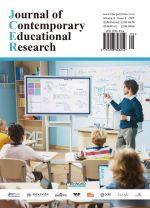Reconstructing Food Professional English Course Teaching to Meet Future Food Industry Needs: A Practice-Oriented Exploration from the Perspectives of Globalization and AI Empowerment
Abstract
With the development of globalization, international communication in the food industry has become increasingly frequent. Mastering English skills related to the food profession can help students communicate effectively with international peers, enhance their adaptability in international enterprises, and boost their employment competitiveness, thereby expanding career development opportunities. The food professional English course is a mandatory subject set by universities to cultivate high-quality talents in the food field, enabling students to better understand the food cultures and consumption habits of different countries and regions. Furthermore, mastering relevant English skills allows students to access cutting-edge food science research techniques and the latest scientific achievements, promoting innovation in research levels. To enhance the cultivation of English skills and comprehensive qualities among food professionals, which will have a profound impact on their future learning, research, and career development, this article primarily analyzes the teaching reform pathways for food professional English courses under the new conditions of globalization and artificial intelligence. It was hoped that the viewpoints presented in this article can provide relevant guidance for the improvement and enhancement of food professional English courses.
References
Yang L, Zhang X, Wang J, et al., 2021, Teaching Reform of Food Specialty English Course Based on OBE Concept. Farm Products Processing, 8(16): 108–111.
Yang J, Liu Y, Shi J, et al., 2021, Exploration on the Teaching Reform of Food Specialist English in Universities under the Background of “Internet +”. Farm Products Processing, 2021(14): 102–103.
Zhang H, Xu Y, 2020, Reform and Practice of English Teaching for Food Specialty. Farm Products Processing, 5(10): 93–94.
Sun Y, Xia Y, Zhang H, et al., 2025, Research on the Teaching Reform of Food Science English Course Based on Multiple Teaching Theories. The Food Industry, 46(06): 306–309.
Li R, Yang Z, Fan X, et al., 2024, Exploration and Practice of the Mixed Teaching Mode of Food Professional English Course. Guangdong Chemical Industry, 51(15): 212–213 + 226.
Wang N, Jin J, Liu C, et al., 2021, Project Teaching Mode Driven Curriculum Reform of Food Specialized English. Farm Products Processing, 2021(06): 118–120.
Zhang Y, Tang Q, 2025, Integrating AI-Generated Content Tools in Higher Education: A Comparative Analysis of Interdisciplinary Learning Outcomes. Scientific Reports, 15(1): 25802.
Wang T, Lund B, Marengo A, et al., 2023, Exploring the Potential Impact of Artificial Intelligence (AI) on International Students in Higher Education: Generative AI, Chatbots, Analytics, and International Student Success. Applied Sciences, 13(11): 6716.
Alyoussef Y, Drwish A, Albakheet F, et al., 2025, AI Adoption for Collaboration: Factors Influencing Inclusive Learning Adoption in Higher Education. IEEE Access, 13: 81690–81713.
Xia Q, Zhang X, Han C, et al., 2023, Design and Exploration of Dual-Oriented Teaching Mode under the Background of Artificial Intelligence: In the Case of Food Professionals English. Farm Products Processing, 5(10): 117–120.
Rahiman H, Kodikal R, 2024, Revolutionizing Education: Artificial Intelligence Empowered Learning in Higher Education. Cogent Education, 11(1): 2293431.
Zou D, Luo S, Xie H, et al., 2022, A Systematic Review of Research on Flipped Language Classrooms: Theoretical Foundations, Learning Activities, Tools, Research Topics and Findings. Computer Assisted Language Learning, 35(8): 1811–1837.

